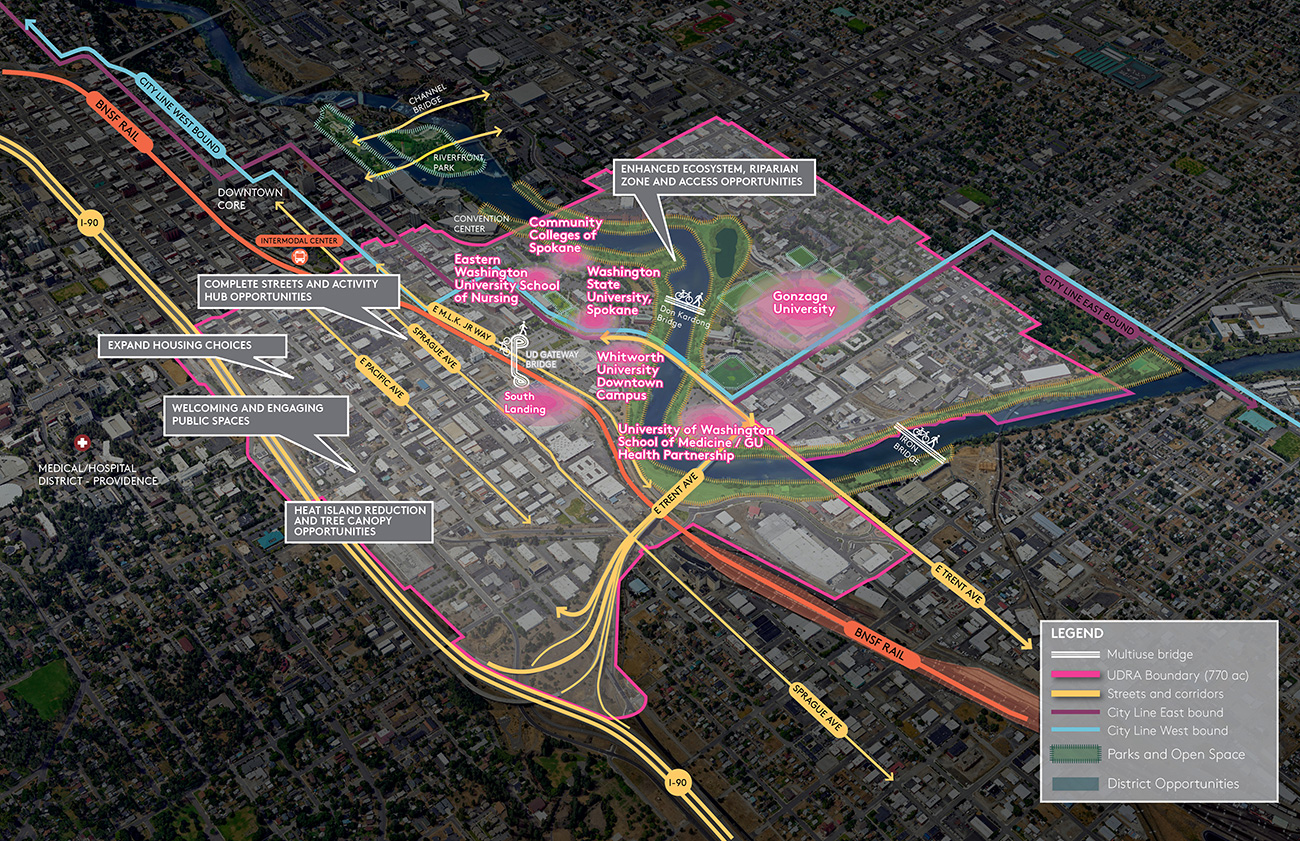

The Future of Innovation: Nature & Equity-Inspired Collective Action in Spokane’s University District
This webinar explores the long term planing and development of Spokane’s University District, a vibrant and dynamic 770-acre district home to 20,000 students, faculty, and staff across five major universities and community colleges, two medical school programs, a nationally recognized smart city testbed, and an emerging life sciences cluster. Established in the 1980s as a special funding district to revitalize Spokane’s east downtown area, it has since attracted over $1 billion in investment, emerging as one of the Inland Northwest’s fastest-growing urban centers.
In the coming years, University District leaders are looking to add 1,000 additional housing units and significant institutional, commercial and retail space to the area. The recently unveiled Next Generation Conceptual Plan 2065 sets a visionary course for this growth, distinguished by its dual focus on climate resilience and social-racial equity. While much of Spokane has experienced robust development and investment momentum in recent years, the East Central neighborhood and southern portion of the University District have fallen behind. This area’s challenges stem from historical redlining practices, industrial pollution, and significant community displacement during the I-90 highway construction in the 1960s, resulting in decades of underinvestment.
Webinar Speakers
Juliet Sinisterra, CEO, Spokane’s University District Development Association
Juliet is the CEO of Spokane’s University District Development Association and the University District Public Development Authority since 2021, Juliet brings over 25 years of experience in urban design, master planning, project management, community engagement, and sustainable community development from her work in both the Seattle and Spokane areas. Juliet has served as Economic Development Manager for the Downtown Spokane Partnership, where she led the development of support services for downtown Spokane businesses and startups through strategic planning, urban projects, public art, and partnership development. Juliet also oversaw the community vision development and management of the Riverfront Park Master Plan which led to the successful voter approval of a $64.3 million bond. Juliet holds a professional Bachelor of Architecture degree and a Bachelor of Science in Architectural Studies from Washington State University. Juliet also holds certificates in urban design from Syracuse University, Florence, Italy, and in Transition Towns.
Jonathan Teeters, Policy Director, Empire Health Foundation
Jonathan has 20 years of experience leading values-based racial, social equity, environmental, and economic change campaigns for candidates and organizations across electoral, non-profit, government and private sectors. As Policy Director for Empire Health Foundation and the Empire Health Community Advocacy Fund, Jonathan drives the Foundation’s policy programming and government affairs strategies in supporting power shifts and political and systems change within BIPOC, LGBTQ2IAS+ and rural underserved communities in the Inland Northwest. A native Washingtonian, he earned an MBA in Sustainable Business Systems and degrees in conservation biology, ecology, and Spanish from the University of Idaho, while competing as a member of the U of I football team. Jonathan enjoys cultivating his connection to nature and outdoor recreation as an avid angler and hunter.
Erin Ishizaki, Partner, Mithun
Erin Ishizaki, AIA, AICP advances sustainable, equitable development and strategies through her work as a designer and Partner at Mithun. Inspired by the transformative power of connections – to place and to each other – Erin’s urban design and planning practice integrates community-based research and public health methods into co-design. Her experience collaborating with communities includes transit-oriented development, housing, and high-performance districts. Erin was recognized by the Urban Land Institute as a Global 40 Under 40 Professional regularly contributes to discourse and publications on urbanism and the transformative power of design. Her award-winning work and collaborative, listening approach highlight the nexus of well-being, resilience, and inclusion in projects that maximize investment for all. Erin volunteers with WA APA and ULI Northwest as well as APA’s Sustainable Communities Division.
